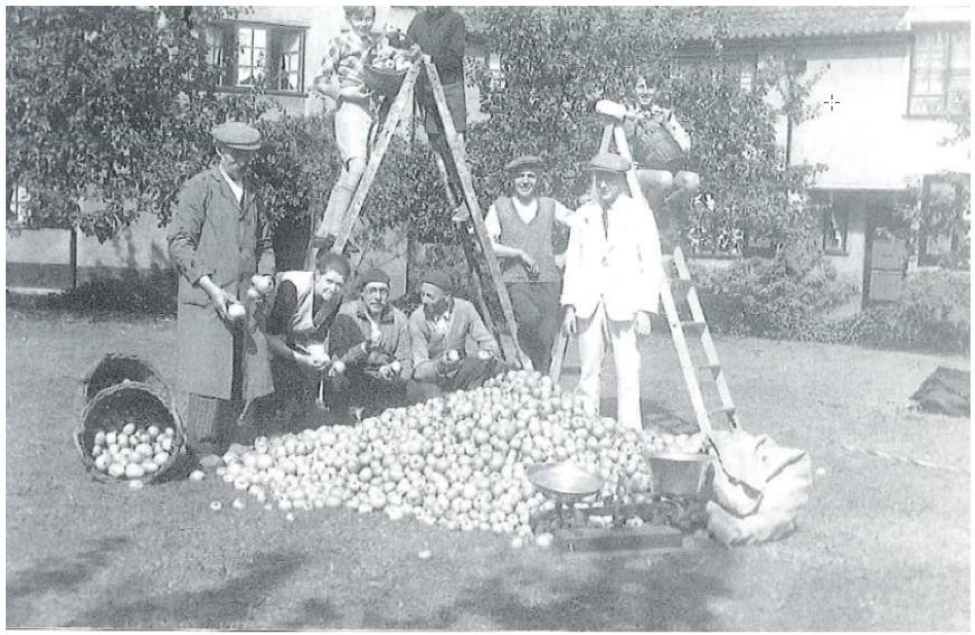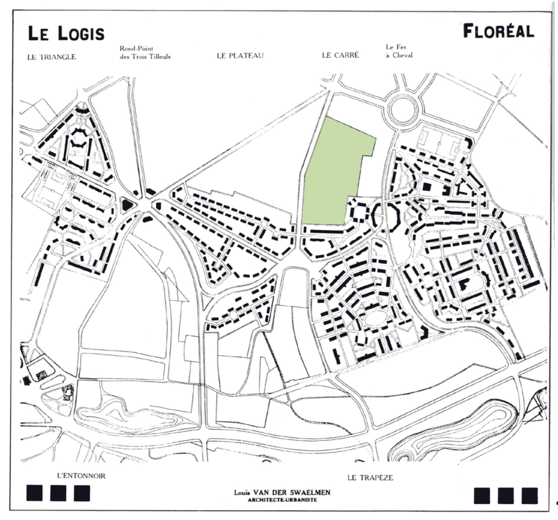How can we move beyond this conversation stopper?
Growing space as planning requirements

Cueillette des Pommes à la cité‐jardin – Le Logis-Floréal À Watermael-Boitsfort, 1940
The Ferme du Chant des Cailles is a collective urban agricultural project initiated by farmers together with local citizens in a residential neighbourhood in Watermael-Boisfort, in the south-east of Brussels. The land on which the farm was established lies in the heart of the Logis Floréal, a garden suburb developed in the 1920’s designed by Louis Vanderswaelmen. The land was reserved in the original plan for a farm that was never built, but the settlement included individual productive gardens, productive fruit trees in the public domain and an orchard. The pressing need for new social housing in Brussels led the authorities to consider the land historically reserved as a productive space for the construction of 250 additional housing units, especially since the social housing company was owner of the land. However, the mobilisation of local citizens put the process of the development project on hold. The coalition of citizens even mapped vacancies in the neighbourhood, questioning the need for new development. What started with the idea of repurposing an abandoned field developed into a process of reappropriation of a historical urban pattern, relinking housing and food production, underlining the need for new planning tools and processes that consider community-build food production as equally valuable on the urban agenda as housing, schools or playgrounds.

Historical plan of Louis Vanderswaelmen with the historical productive land that today hosts the Fermes du Chants des Cailles highlighted
Creating a shared future through soil care

The 'Roving Microscope’ is a community-based initiative that is looking into soil and exploring more-than-human ecologies based in and around Bethnal Green Nature Reserve in Hackney. With many people in urban areas alienated from the land, growing food, and soil, general knowledge about and connection with local soils are often limited. The Roving Microscope tries to directly answer this situation by bringing people together to look at the soil in microscopic detail and see how it is alive. As Hari Byles of Roving Microscope says: “Soil is a living community that cares for us as we care for it” .
Healthy soils provide benefits which stretch in time and space beyond their current geographical location - through carbon capture, flooding prevention, water management, food production, supporting biodiversity, and so on. Soils should be viewed in a similar way to air and water, as something which it is in everyone’s interest to actively take care of. Humans can actively support the microbiome and structure of the soil by growing using agroecological methods, and building soils locally as opposed to importing soils extracted from ecosystems often under threat elsewhere. Work such as that of the Roving Microscope share with the political agroecology movement an ethos of soil care. In order to insert principles of agroecology within the hearts and minds of urban communities, work is needed to deepen people’s understanding of soil, the life it supports, and how to care for it.
Building on the effective use of zoning as a counterspeculative measure

Spanish cities have been able to protect farmland on the peri-urban fringe through effective land use instruments and the establishment of so-called agricultural parks. The measures have been reasonably successful in stopping the destruction of agricultural soils (Miralles I Garcia 2015, 2020) but show mixed results when it comes to delivering a transition towards agroecological ways of farming. Many of these agricultural parks are situated within naturally sensitive areas. This provides clear opportunities to link nature development and biodiversity goals to the establishment of conditions in which only certain farming models can thrive. Agroecology can be a gamechanger in such a context, as it is a farming model that can accelerate the evolution towards nature inclusive forms of farming and move beyond the conflict between environmental goals and agricultural development. Zoning measures aimed at protecting farmland may be supplemented with legal measures to protect high valued soils, as is the case in the Parque Agrario de Fuenlabrada, near Madrid (Yacamán Ochoa, Mata Olmo, 2017). The categorization of soils goes hand in hand with the installation of farming models that start from principles of soil care and the ecological reproduction of soil fertility.
When agroecology reorganises your municipality

“Agroecology demands the complete reorganisation of municipalities. People from social economy, food production, the environment, health and planning, they all have to work as one multidisciplinary team.” according to Raul Terrile, one of the driving forces behind the Urban Agriculture Programme of Rosario. “ Key member of the agroecological movement joined the ranks of the municipal administration and reached out to their new colleagues across different departments. It set off a wave of collaboration and capacity building across the urban administration that ensures the rootedness of healthy food in the capillaries of urban policies and investments.
Dormant public land was made available; the former plant nursery for urban park management became an agroecological reference centre; parks were turned into garden parks, urban waste streams resourced for composting, buffer strips between roads rendered productive; the housing department started to stimulate growing on terraces and balconies; hospitals provided land for medicinal gardens; prisons set up demonstration gardens and many schools today cultivate their own educational garden. Looking at the list of what has been set up in the last 20 years, one begins to see the cross-over between urban and agroecological infrastructure. This summary can be read as a wish list for a future urban centre for agroecology. It is the result, however, of a persistent and consequent strategy to wield agroecology as an integrating and transversal urban strategy and bundle public investments accordingly.
The Rosario Agroecological Centre (CAR) is a public space that was implemented in 2017 within the framework of the Urban Agriculture Program of the Social Economy Secretariat of the Municipality of Rosario, to seek innovative responses to the demands of new actors interested in urban agriculture. The centre played an important role in valorizing and giving visibility to the knowledge and techniques built jointly in the territory during the last 30 years. The CAR works with research institutes, educational institutions, orchard organizations and non-governmental organizations, social movements and is associated with the Secretary of Extension of the National University of Rosario, the Polytechnic Institute, the Ministries of Production and of Health of the province and the Secretaries of Health, Environment and Production among other municipal dependencies; the Municipal Employees Association (AMTRAM), the Institute of Physics Rosario (CONICET – National University of Rosario), the National Institute of Agricultural Technology INTA and the Association for Biological-Dynamic Agriculture of Argentina.
Agroecologically articulated water policy

As part of the development of its urban food policy, Paris set out a clear ambition for the management of its drinking water catchment areas: develop organic farming areas in water catchment areas and in that way increase the overall supply of local organic food. The public company in charge of the city’s drinking water distribution System, Eau de Paris, is promoting and supporting the preservation and development of organic agriculture. In addition to offering technical support, tools and advice for existing farmers to convert to organic agriculture, the city also developed an active land policy to make land available to organic farmers through an ecological lease (“bail rural environnemental”).
The city is examining legal possibilities for supplying Parisian collective catering with produce from catchment areas, and is also working on a label to promote the origin of products from catchment areas.